One of the questions that are often asked of marketers is whether budgets should be allocated toward SEO or PPC or spread between both.
This is a simple question that doesn't have a simple answer as it very much depends on a whole host of different factors, including:
Your goals and objectives Your budget and resources Your industry Your current performanceBut these discussions are nothing new. There has been an ongoing debate around SEO vs. PPC for many years. Deciding where best to invest your marketing budget can be a difficult task for business owners. So, the big question is: Is it better to use pay-per-click (PPC) to buy your way to the top of the search results or should you put your efforts into an organic (SEO) strategy?
You know you can't ignore channels that can drive traffic from the search engines, but which is the higher priority?
It depends.
To make a decision on which strategy to use, you need to understand the pros and cons of both SEO and PPC, and how they can work together to drive growth for your business. In this guide, we'll dive deep into each of these tactics and help you to figure out which channel is right for you, specifically looking at:
SEO as a Growth Strategy The Pros of SEO The Cons of SEO PPC as a Growth Strategy The Pros of PPC The Cons of PPC SEO vs PPC — Which is Right for Your Business? Choosing a Single Channel Integrating SEO and PPC for Search Success Retargeting Run Ads and Use Data to Inform Your SEO Strategy Own Brand Bidding Using Shopping Ads to Target BuyersSEO as a Growth Strategy
SEO is all about ranking on the organic (or natural) results on a search engine results page (SERP).
Run any search on Google and the organic listings are those that come after any paid ads or shopping results and are what have historically been known as 10 blue links.
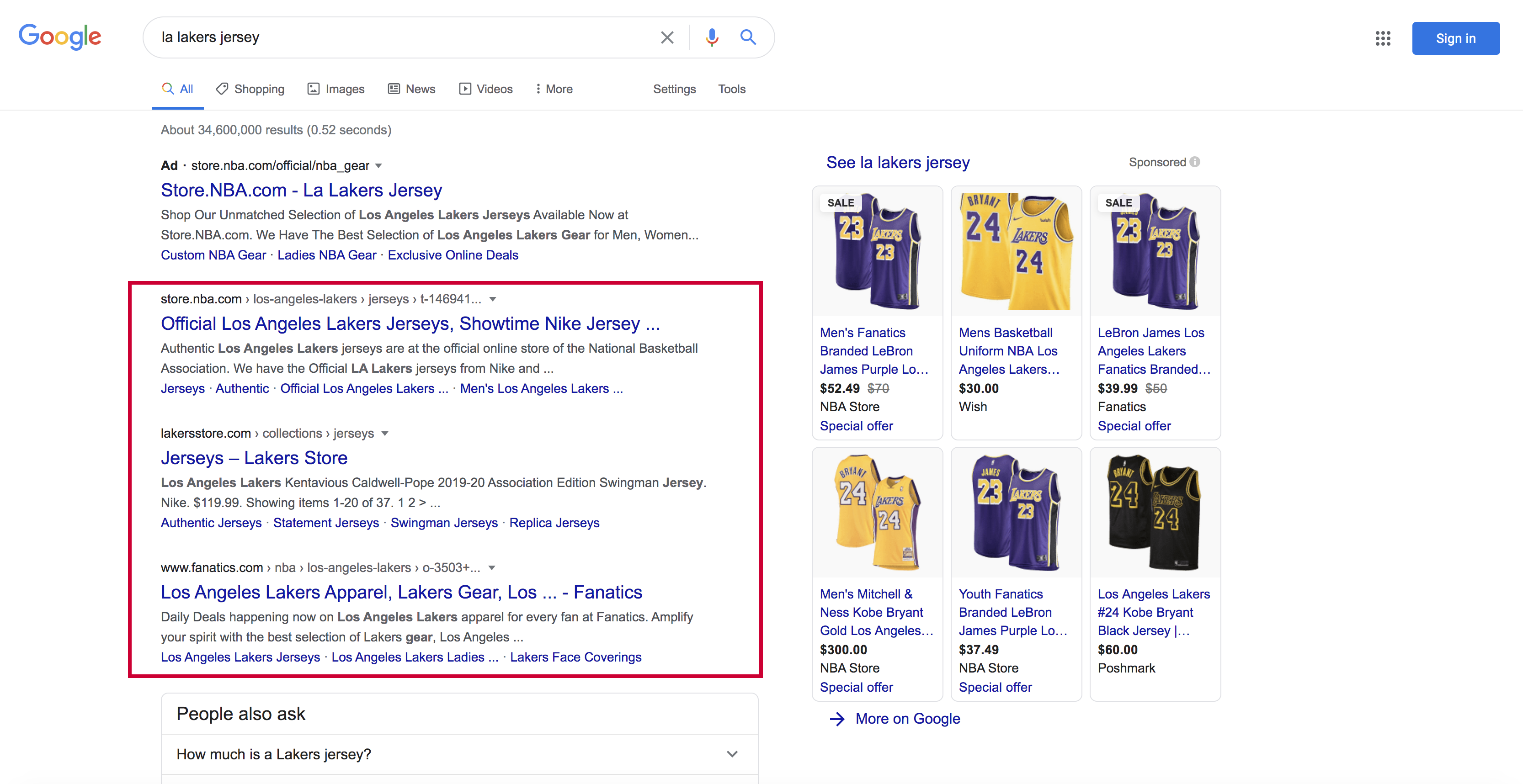
To succeed at driving increased visibility from SEO, it is important to understand how to properly optimize your website. You need to ensure that the search engines are able to crawl your site, understand your content, index it, and show that your site is a significant authority.
With more than 200 ranking factors used by Google's Algorithm, it takes a smart marketer (or, more realistically, marketing team) to understand how to win at:
Technical SEO On-Page SEO Link Building Content Marketing UX and so much more!However, ranking is no simple task. The complexity of SEO (at least in comparison to other channels) and the fact that Google's algorithm is constantly being updated means that it takes the right balance of a multitude of factors for your site to perform well.
And, according to Jason Barnard in our “What is SEO?” guide:
How high in the rankings and how often you appear is merit-based; these engines will show the results they consider to be the best fit for their users.
— Jason Barnard
SEO is all about creating the best result on the web for a search query and those who are able to do that can drive significant volumes of traffic.
The Pros of SEO
But just what are the main advantages of SEO that you need to know about when figuring out where to invest your marketing budget?
Organic SEO can be one of the most cost-effective ways of improving your site's visibility and can place you right in front of your target customers and clients when they're running a search for businesses just like yours. Organic clicks are free, and won't cost you a cent. Of course, it takes investment in time and resources but there are no 'click' costs, as there are when running a PPC campaign. Get SEO right and it's free traffic. Once you've achieved strong rankings from an SEO strategy, you can expect to see sustained results. Your business is showing to potential customers 24/7, whereas PPC ads will often stop displaying when the budget runs out or when you've specified to do so at less cost-effective times of the day. Organic SEO usually means more stability. Your rankings should remain relatively consistent if you optimize your site in the right way. PPC ad positions can fluctuate a lot more depending on your competitor's bidding strategy. When it comes to running ads, you're going to be more inclined to spend your budget on middle- or bottom-of-the-funnel keywords to drive conversions as quickly as possible. At least this is often the case for businesses working to limited marketing budgets. But when it comes to SEO, you can create content that targets each different stage of the funnel without needing to pay for every click. In most cases, SEO is a more cost-effective channel than PPC in the long run, given that the costs involved in using an agency or hiring a team typically remain very similar even though traffic and conversions grow. This isn't the case with PPC as you're paying for every click. On average, Google's organic results attract more than ten times the number of clicks than paid results, according to a 2019 study by SparkToro. That means you get a higher volume of traffic to your website without worrying about ad spend.The Cons of SEO
But with pros come cons, and here are some of the reasons why SEO isn't always seen as the right strategy for every business:
SEO takes time, especially for a new business or domain. In fact, it can take months for your site to rank in top spots for competitive keywords. With PPC you see results as soon as your ad campaigns go live, as long as your bids are high enough. To achieve SEO success in a competitive market you need to invest in SEO. Given that a solid organic strategy involves technical SEO, content creation, link building, data analysis, and more, you really need a team of experienced marketers to assist with a solid strategy. This means there could be a considerable investment either in building an in-house team or hiring a specialist agency. SEO is an ongoing process that requires continued investment. There may be tweaks and improvements to make and you need to understand that your site will never be 100% “optimized.” From content creation to link building and ongoing technical SEO audits, there's always work to be done. SEO is time-consuming and can be overwhelming, especially given that Google makes hundreds of changes to its algorithm every year. You'll need to be sure to keep up with any algorithm updates in order to stay ahead of your competitors. Using the Semrush Sensor can help you to keep an eye on changes.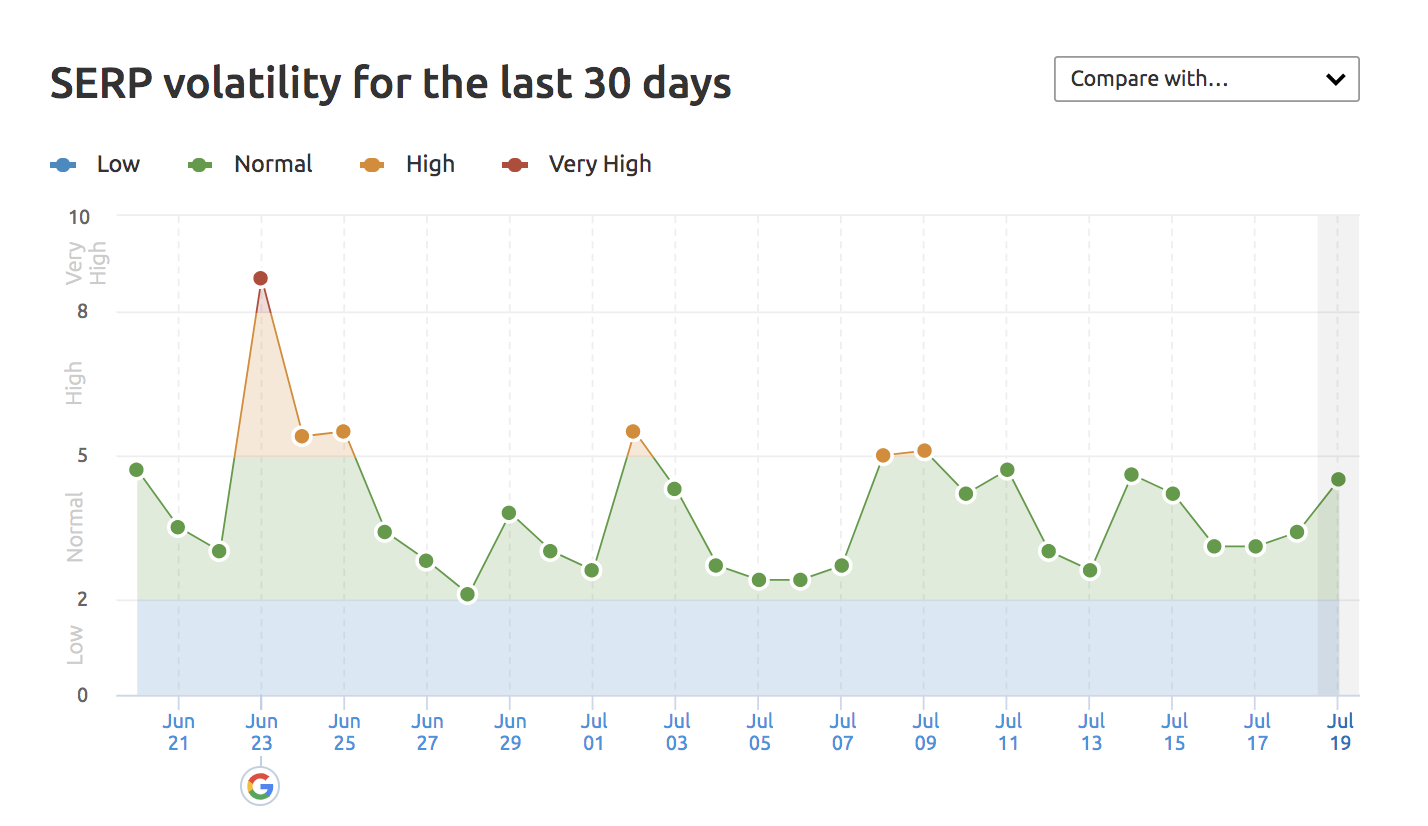
PPC as a Growth Strategy
PPC relates to paid advertising on the search engines, usually run through Google Ads or Bing Ads.
Here's that previous screenshot of a SERP, but now we'll focus on the paid ad listings.
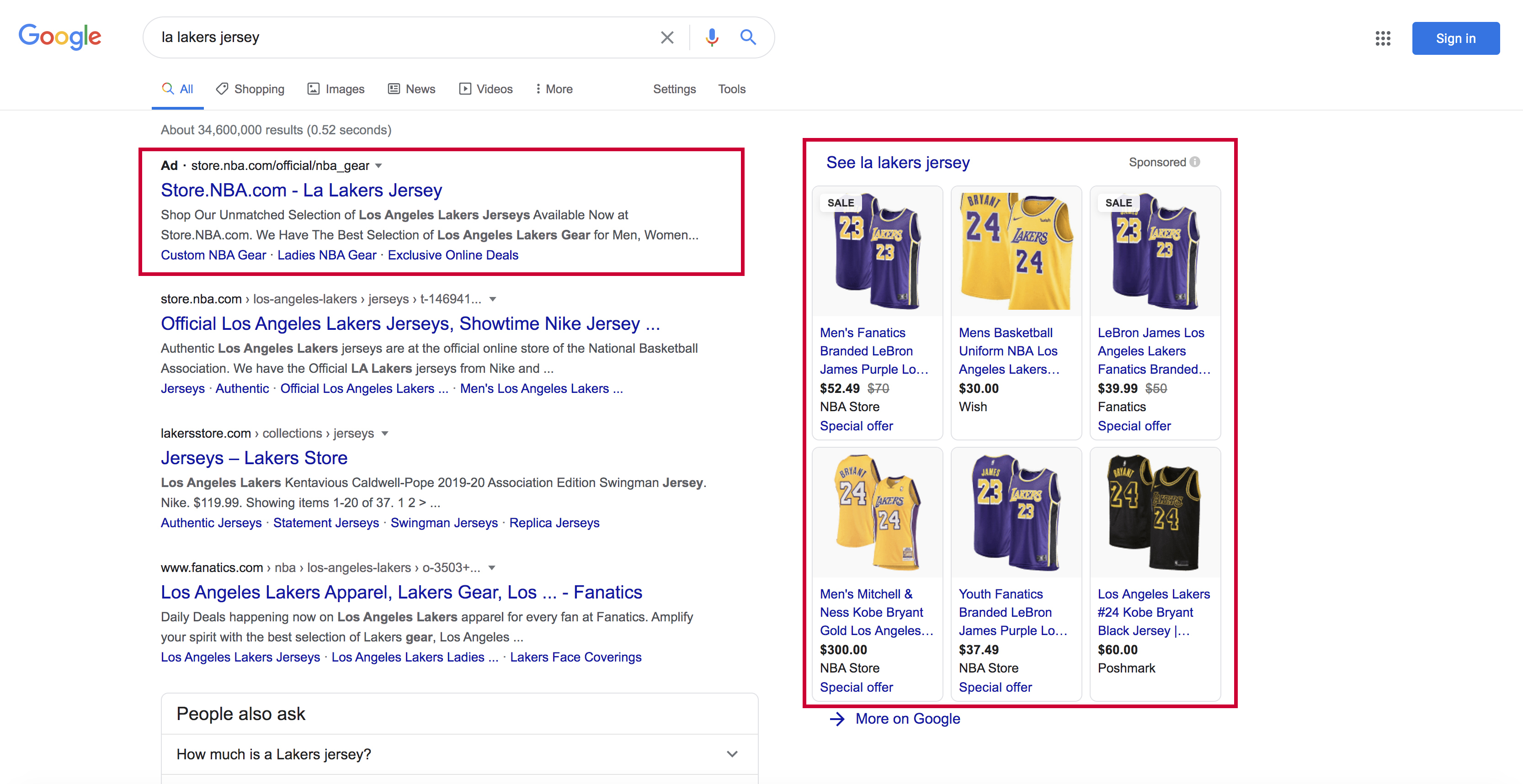
This screenshot shows just two examples of available ad formats: search ads (the text ads at the top of the SERPs) and shopping ads (the product ads down the side of the main results). Other PPC opportunities include YouTube ads, display ads, Gmail ads and remarketing, as well as multiple formats of these available to be used.
But whereas SEO delivers free clicks, PPC ads require you to pay every time someone clicks on your ad. This means that it's very common for businesses to spend hundreds, if not thousands, of dollars every day to drive traffic to their website.
But what makes PCC such an effective marketing channel?
The Pros of PPC
PPC allows you to see almost instant results. Almost immediately after your PPC campaign goes live, you'll start to see traffic, clicks, and conversions. Meanwhile, it can take months to achieve these results with SEO. You'll probably have noticed where PPC ads are placed on SERPs: right at the top of the page.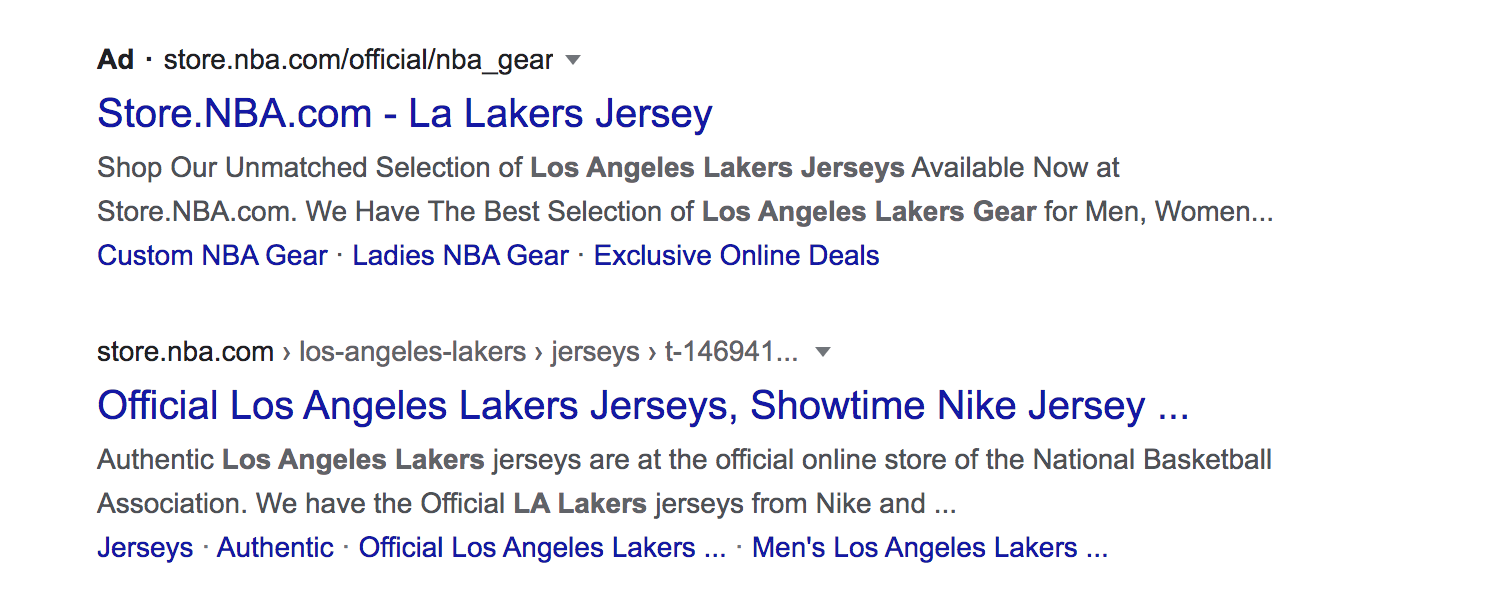
The Cons of PPC
While PPC offers a wealth of benefits to businesses, it does come with its downsides, too:
Unlike SEO, traffic from PPC advertising isn't free. Every single click that is made to your website from an ad, you've got to pay for. And while some industries see relatively low click costs, others can be upwards of $10 per click (see our CPC Map for more insights into estimated click costs). You can also use the Keyword Magic tool to see the estimated CPC for any keyword.
SEO vs. PPC — Which is Right for Your Business?
Now that we've looked at both SEO and PPC and the respective pros and cons of each channel, it's time to answer the big question: which one is right for your business?
The reality is that this depends. But there's a hybrid choice here as well; you can choose to integrate the two.
To quickly recap, here's a handy side-by-side comparison of each of these channels:
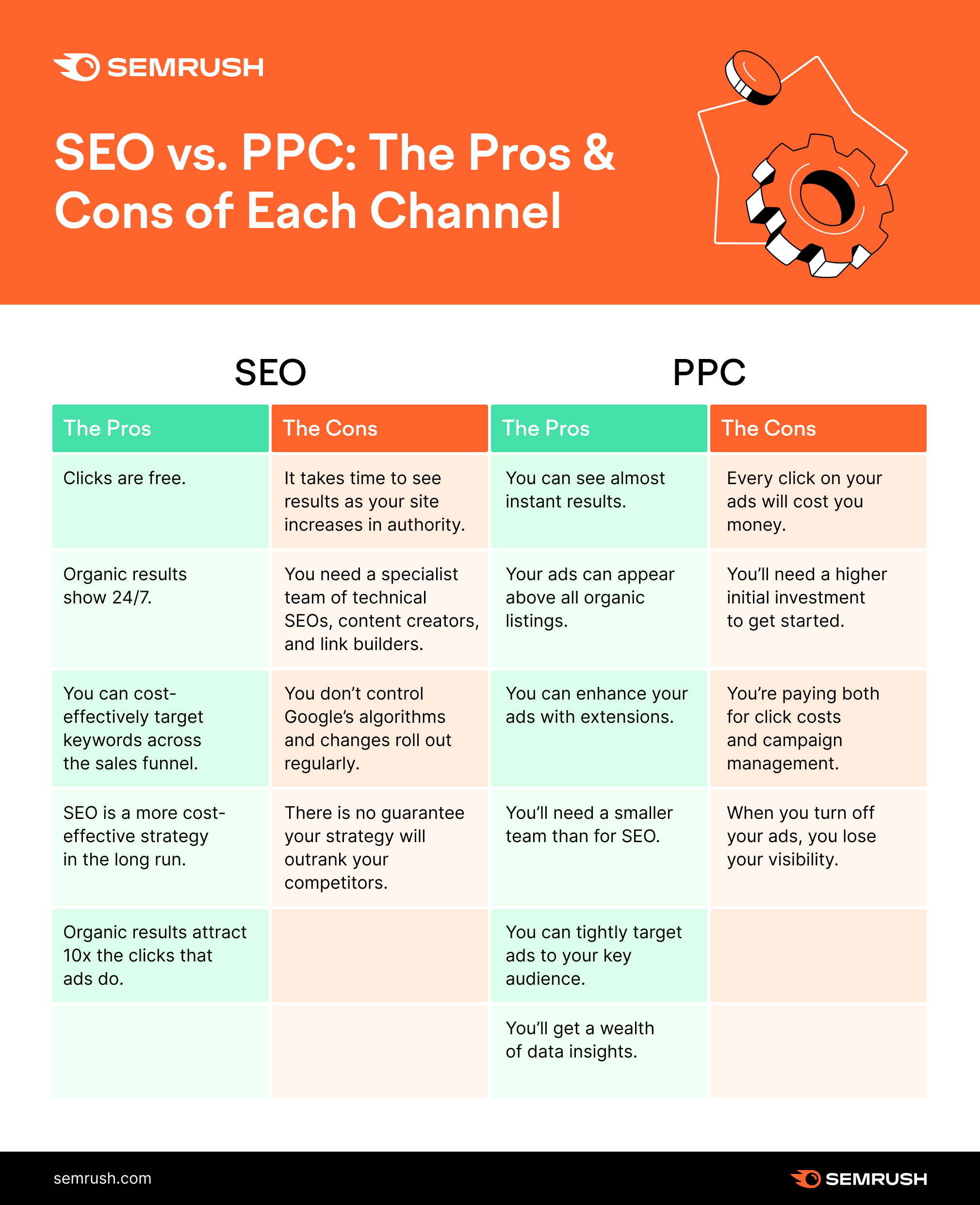
Choosing a Single Channel
If you've decided to only pursue a single channel to invest in, you're going to need to think about the specific situation of your business, and the balancing of the cost and investment against the speed of seeing returns.
Here are some common scenarios and single-channel recommendations for each:
If you need to drive results quickly, whatever the cost, choose PPC. If you're already driving sales from other sources and want to maximize your returns long-term, consider SEO. If you're looking to test a new product or offer, use PPC. It's easier to quickly drive traffic to your site, you can set a fixed budget, and you are able to turn ads off if needed. If you want to accelerate the awareness around your business with top-of-the-funnel traffic, choose SEO to focus on a solid content strategy.Integrating SEO and PPC for Search Success
The reality is that for most businesses, it's almost impossible to choose between SEO and PPC, for the simple reason that the two integrate really well together to drive search success. It's not always simply SEO vs. PPC; each channel can complement the other when properly utilized. And when your budget allows you to use both, you absolutely should, even if only as a way to balance short-term and longer-term returns.
But let's take a look at how you can integrate SEO and PPC...
Retargeting
Did you know that you can serve ads to people who have already visited your website?
This is known as retargeting or remarketing, and you can build and segment lists of people who have engaged with your site. For example, if a user visited a certain page or added a product to their basket then abandoned the site, you are able to serve ads specifically to these users to encourage them to return to your site through ads on the SERPs or via banner ads on the Google Display Network. You could increase your bids for someone who abandoned their basket, meaning that when they return to the SERPs and search again, your product(s) or ads will be more prominent as you're bidding higher for this audience.
Run Ads and Use Data to Inform Your SEO Strategy
You can gain valuable insights from your PPC activity that can feed straight into your SEO strategy. Since PPC provides faster, real-time data to create better ads, you can use this to your advantage from an SEO point of view.
Use data and findings from conversions, ad headlines, messaging, and calls-to-action (CTAs) to prioritize your SEO strategy around the terms and keyword groups that have the strongest conversion rate. The insights from your PPC campaigns give you a glimpse into areas that might need more attention in order to scale success. Looking to create effective ads and speed up copy creation and testing? Semrush offers AI-powered solutions that can automatically extract metadata, text, images, and even keywords from your landing page and generate thousands of different ad copy combinations. This way, you do not have to spend hours creating ad copy in different formats and can focus on more strategic tasks.
Own Brand Bidding
It's not uncommon to find that another company bids on your own brand name.
Yes, you read that correctly. Businesses often bid on another business's brand name with ads. If you're relying solely on SEO, you'll likely have the top organic result for your brand name. However, a competitor that bids on your brand name could be showing above you on the SERPs.
And this is frustrating as a marketer or business owner.
In instances like this, you can use PPC to bid on your brand terms to maximize your visibility, meaning that a searcher should end up clicking onto your site regardless of the channel they take to your site (clicking ads or organic).
Using Shopping Ads to Target Buyers
If you're an eCommerce business who is selling products online you cannot ignore shopping ads. Even if you rank strongly organically through a great SEO campaign, you're going to need to create a compelling and effective pay-per-click campaign.
Statistically, consumers are drawn into product listing ads, given that they display images and prices straight on the SERPs. A consumer can quickly see exactly which products are available to them and at what price. You should be using shopping ads alongside SEO to make sure that you're maximizing your visibility on SERPs and covering all options on how your customers want to find a new supplier of products or services.
The reality is that instead of worrying about SEO vs. PPC, you should be working on a strategy that integrates both SEO and PPC to take up a higher amount of real estate on the SERPs. And to create a strategy that smartly targets the right keywords, use our Keyword Overview tool.But it's important to remember that each is its own channel and that it rarely makes sense for two to be managed by the same person, given that they each require their own set of skills and knowledge to deliver returns.
If you’d like to find out more about how SEO and PPC can work together in harmony, read our ‘SEO & PPC: How Advertising Data Can Improve Your Organic Results (and Vice Versa)’ guide.
Innovative SEO services
SEO is a patience game; no secret there. We`ll work with you to develop a Search strategy focused on producing increased traffic rankings in as early as 3-months.
A proven Allinclusive. SEO services for measuring, executing, and optimizing for Search Engine success. We say what we do and do what we say.
Our company as Semrush Agency Partner has designed a search engine optimization service that is both ethical and result-driven. We use the latest tools, strategies, and trends to help you move up in the search engines for the right keywords to get noticed by the right audience.
Today, you can schedule a Discovery call with us about your company needs.
Source:





